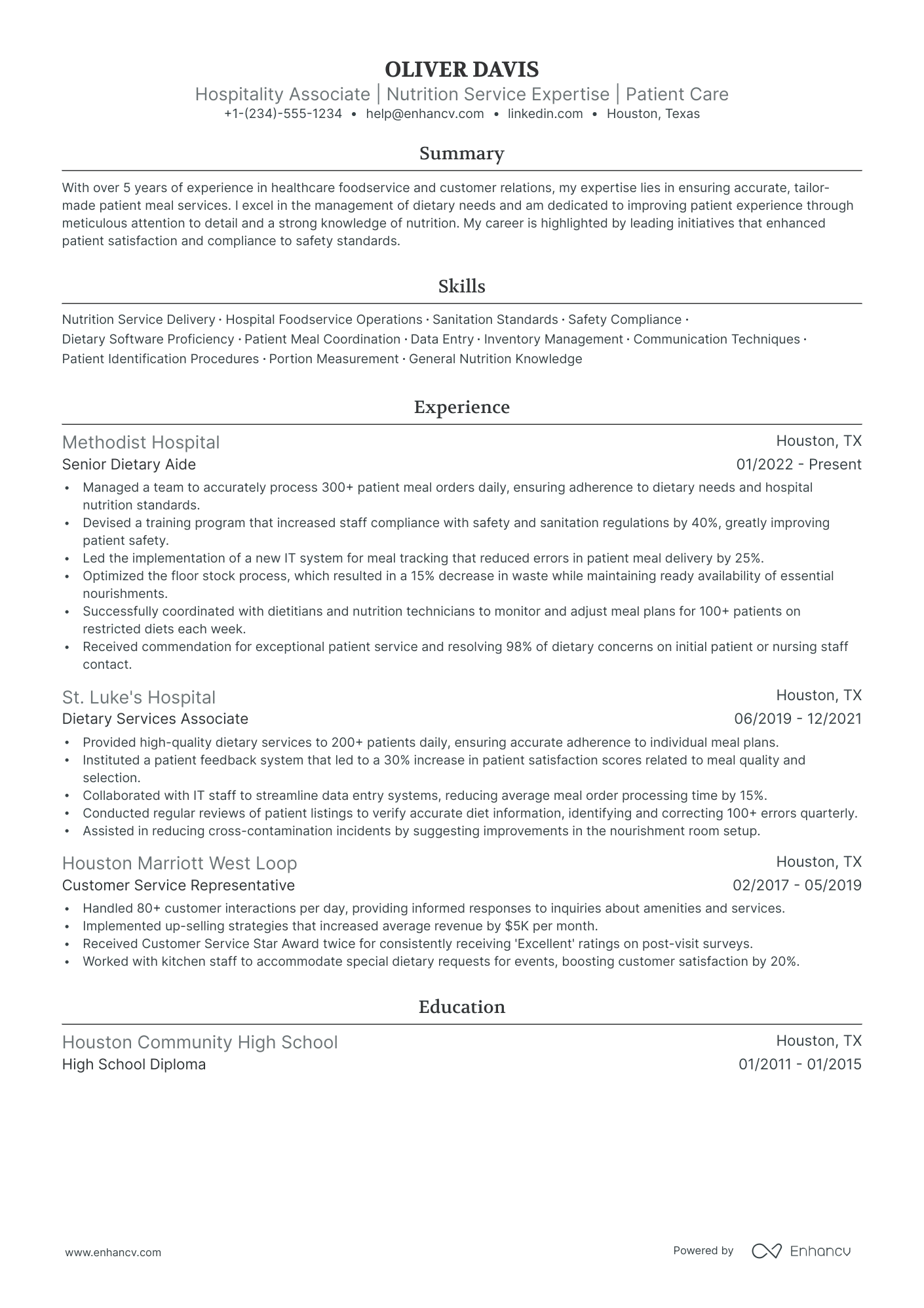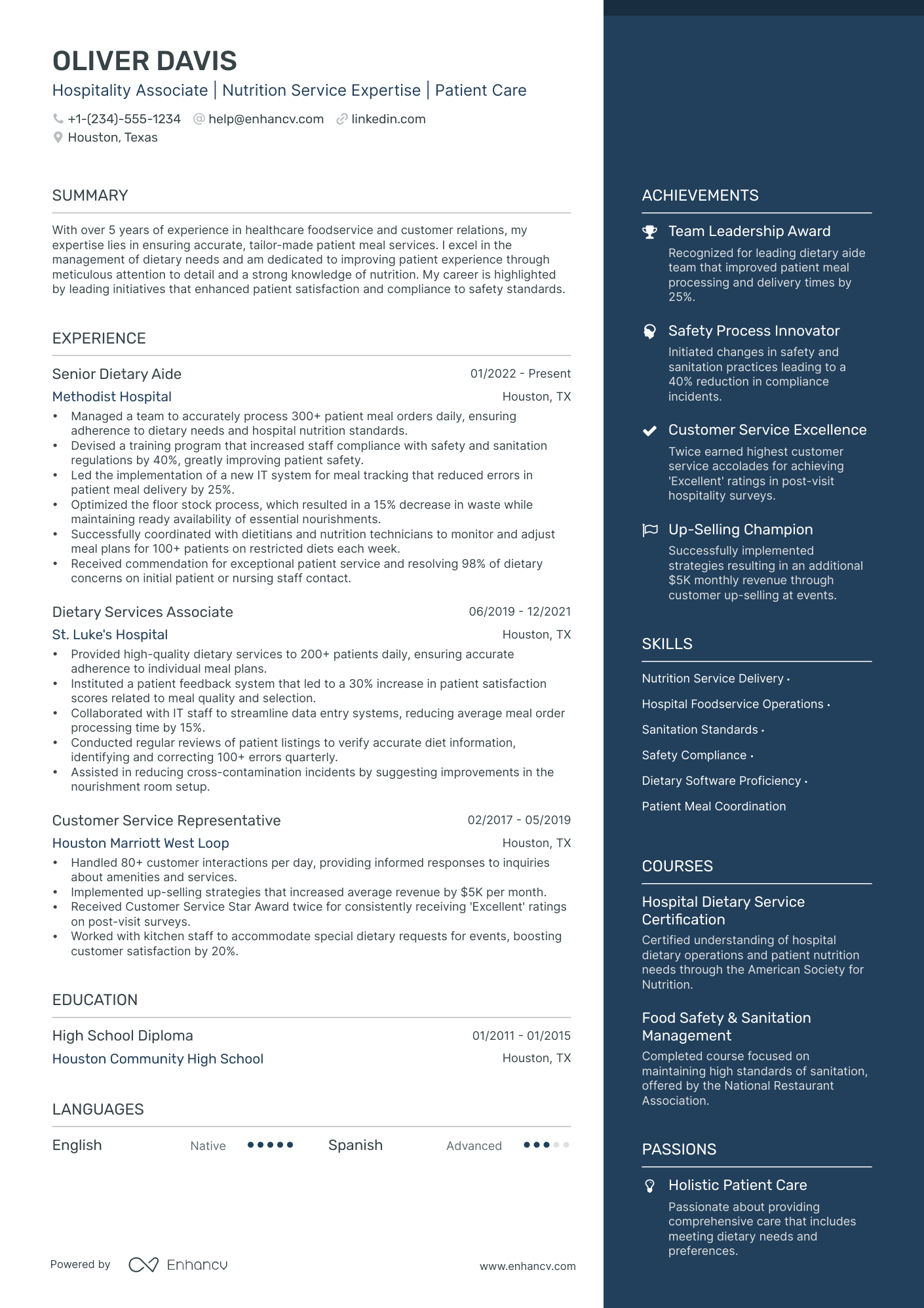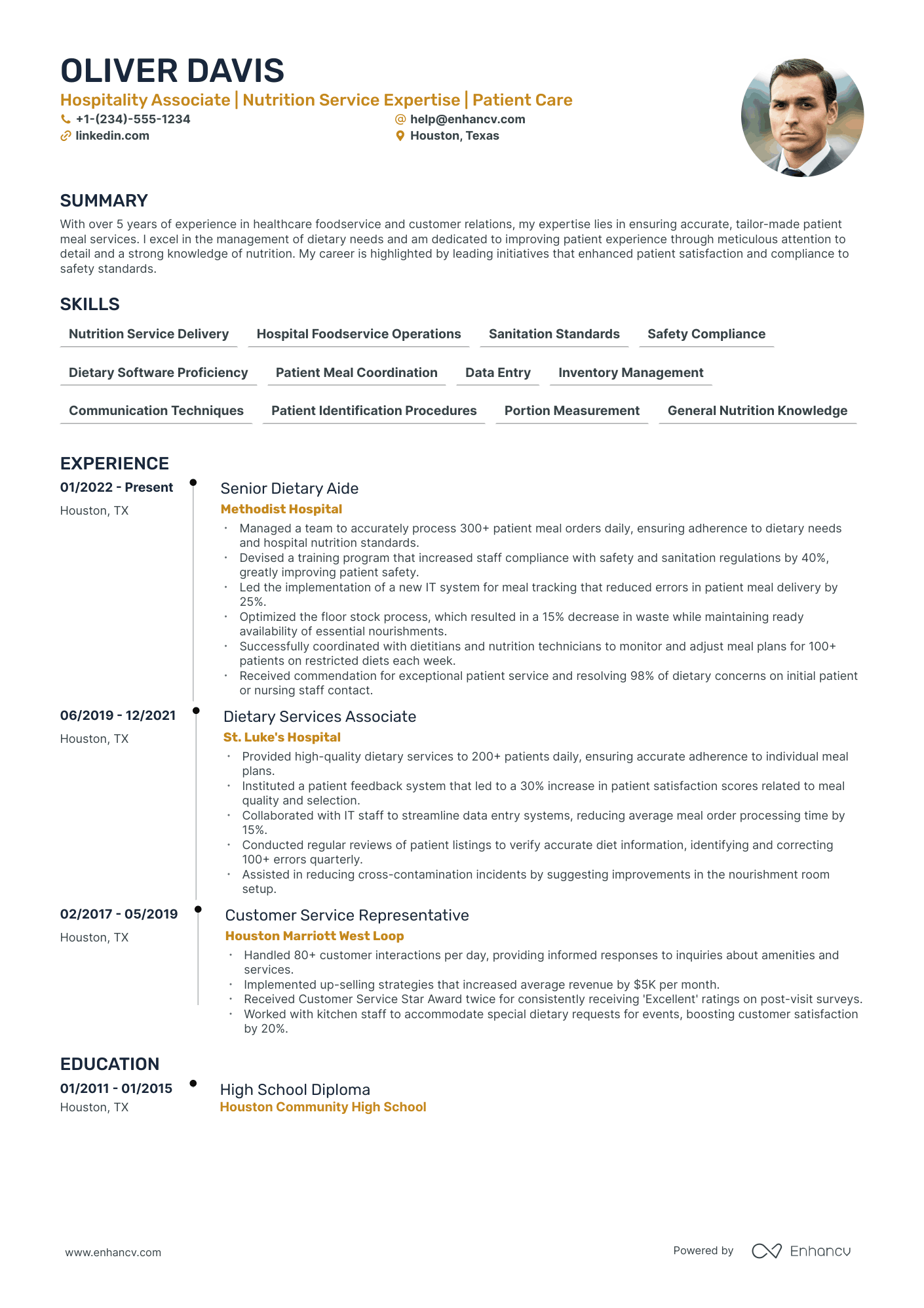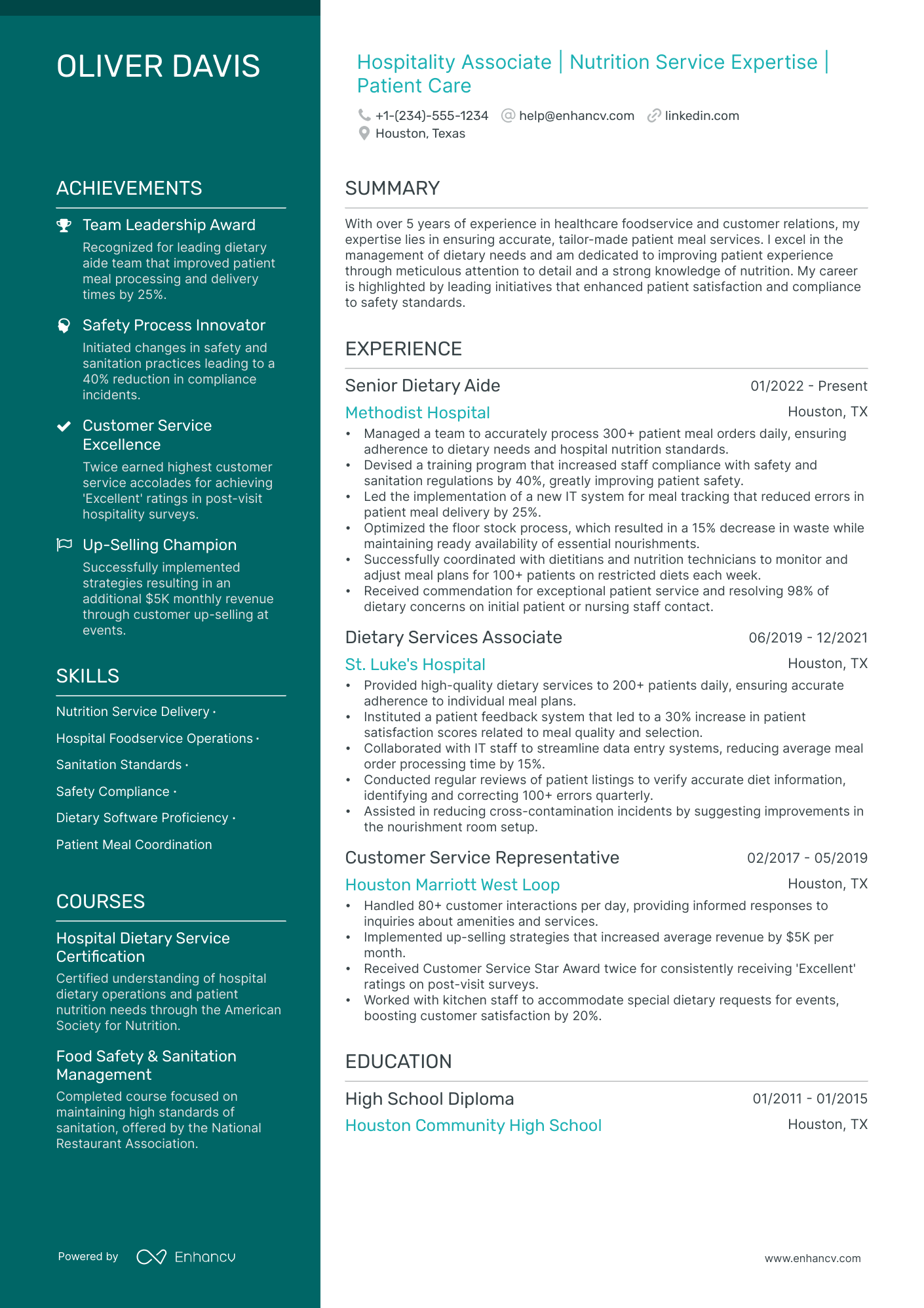One resume challenge you may face in the hospitality industry is effectively communicating your diverse skill set and customer service experience on a single page. Our guide is designed to help you streamline this process, ensuring that your resume showcases your abilities concisely and persuasively to potential employers.
- Hospitality resume samples that got people hired at top companies.
- How to perfect the look-and-feel of your resume layout.
- How to showcase your achievements and skills through various resume sections.
- How you could hint to recruiters why your resume is the ideal profile for the job.
If the hospitality resume isn't the right one for you, take a look at other related guides we have:
- McDonalds Resume Example
- Bar Manager Resume Example
- Fast Food Resume Example
- Baker Resume Example
- Restaurant General Manager Resume Example
- Head Bartender Resume Example
- Restaurant Server Resume Example
- Kitchen Manager Resume Example
- Fine Dining Server Resume Example
- Food Service Manager Resume Example
Is there a correct way to format your hospitality resume?
This is a tricky question. While skimming over your resume, recruiters will be looking at your experience and the message your profile conveys. That's why your resume format needs to be clear and concise, serving to supplement and organize your experience. Professional best practices point that the best hospitality resumes:
- Follow the reverse chronological order, where the most recent experience items are presented first . This is to keep your expertise succinct and to show recruiters your career growth over the years;
- Have a clearly defined header that includes all relevant contact information and a portfolio or a LinkedIn link. In some countries, it is acceptable to include a professional photo , so that your application is more memorable;
- Feature the most important hospitality resume sections towards the top, e.g. summary, skills, and experience. That way, recruiters can immediately find information that is relevant to the role;
- Take up no more than two pages - and two pages are the exception for more experienced professionals. Keep your expertise to the point and use your hospitality resume real estate wisely .
- Selecting modern, yet simple fonts, e.g. Rubik, Lato, etc., would help your application stand out;
- Many candidates stick with the tried-and-tested Arial or Times New Roman, but you'd want your hospitality resume to be a bit more unique;
- The ATS can read all serif and sans-serif fonts, so you should avoid fancy, formal script (or cursive) fonts.
Upload & Check Your Resume
Drop your resume here or choose a file. PDF & DOCX only. Max 2MB file size.
PRO TIP
The more time and effort you've put into obtaining the relevant certificate, the closer to the top it should be listed. This is especially important for more senior roles and if the company you're applying for is more forward-facing.
Ensure your hospitality resume stands out with these mandatory sections:
- Header - the section recruiters look to find your contact details, portfolio, and potentially, your current role
- Summary or objective - where your achievements could meet your career goals
- Experience - showcasing you have the technical (and personal) know-how for the role
- Skills - further highlighting capabilities that matter most to the hospitality advert and your application
- Certifications/Education - staying up-to-date with industry trends
What recruiters want to see on your resume:
- Exceptional customer service skills and experience
- Proven ability to handle and resolve guest complaints effectively
- Experience with hospitality management software and reservation systems
- Flexibility in schedule, including availability for nights, weekends, and holidays
- Demonstrable skills in upselling hotel services and amenities
Writing your hospitality resume experience
Within the body of your hospitality resume is perhaps one of the most important sections - the resume experience one. Here are five quick tips on how to curate your hospitality professional experience:
- Include your expertise that aligns to the job requirements;
- Always ensure that you qualify your achievements by including a skill, what you did, and the results your responsibility led to;
- When writing each experience bullet, ensure you're using active language;
- If you can include a personal skill you've grown, thanks to your experience, this would help you stand out;
- Be specific about your professional experience - it's not enough that you can "communicate", but rather what's your communication track record?
Wondering how other professionals in the industry are presenting their job-winning hospitality resumes? Check out how these hospitality professionals put some of our best practices into action:
- Directed a team of 25 staff members at an upscale restaurant in Downtown Chicago, resulting in an increase in customer satisfaction by 30% as measured by online reviews and surveys.
- Pioneered a farm-to-table initiative with local suppliers that reduced food costs by 20% while enhancing menu quality and freshness.
- Implemented a wine pairings program that boosted evening sales by 15%, attracting a more affluent clientele and expanding the restaurant's market position.
- Managed operations for a chain of boutique hotels resulting in a year-on-year revenue growth of 18% through strategic marketing and customer loyalty programs.
- Led the technology upgrade project that included the rollout of a new property management system, enhancing reservation efficiency and guest experience.
- Spearheaded a staff development program that decreased turnover rate by 25% and fostered a positive work culture.
- Addressed and resolved an average of 30 guest concerns per day, maintaining a 95% satisfaction rate across service touchpoints.
- Collaborated with the housekeeping and maintenance teams to improve room readiness time by 20%, enhancing guest check-in experience.
- Curated bespoke experiences for VIP guests, resulting in a 40% repeat visitation rate and numerous positive high-profile reviews.
- Designed and executed a seasonal menu revamp across all outlets in the resort, attracting media attention and a 12% uptick in dining revenue.
- Trained and developed a kitchen brigade of 50 chefs, which led to the winning of a prestigious industry award for culinary excellence.
- Launched a sustainability program to incorporate organic, locally-sourced produce, cutting down on waste by 30% and ingratiating the brand with environmentally-conscious consumers.
- Oversaw the day-to-day operations of a 300-room hotel, achieving a year-over-year average occupancy rate of 85% which outperformed regional benchmarks.
- Initiated a partnership with ride-sharing services to provide seamless transportation for guests, improving guest satisfaction ratings regarding convenience.
- Negotiated vendor contracts which resulted in a 10% reduction in operating costs while maintaining quality standards for guest amenities.
- Orchestrated over 200 high-profile corporate events and weddings with up to 500 attendees, consistently achieving guest satisfaction scores above 90%.
- Implemented a digital event management system that streamlined the planning process, reducing setup times by 25% and labor costs by 15%.
- Developed strong relationships with vendors and event planners, which expanded the client base by 50% through referrals and repeat business.
- Provided elite concierge services for a high-end clientele, enhancing customer loyalty through personalized attention and bespoke service offerings.
- Masterminded a local attractions partnership program that delivered unique guest experiences and increased in-house service revenue by 22%.
- Coordinated personal shopping and exclusive event access for guests which improved overall guest satisfaction and positioned the hotel as a premier luxury destination.
- Managed a team of 15 front desk employees, ensuring optimal staffing and training leading to a decrease in guest check-in time by an average of 5 minutes per guest.
- Collaborated with the IT department to implement a mobile check-in solution, improving guest convenience and reducing front desk queues during peak hours.
- Analyzed customer feedback to make data-driven decisions that enhanced the front office operations, reflected by a consistent increase in positive guest feedback annually.
Quantifying impact on your resume
- Mention the number of guests you have served on average per shift to demonstrate your ability to handle high-volume service environments.
- Include the percentage increase of customer satisfaction rates during your tenure to showcase your contribution to enhanced guest experience.
- Quantify the revenue growth you contributed to by up-selling or cross-selling amenities and services during customer interactions.
- Highlight the number of staff you've trained or supervised to show leadership and teamwork capabilities.
- Specify the amount of time you've reduced in check-in and check-out processes through efficiency improvements.
- List the size of events or conferences you've coordinated to underline your organizational skills and attention to detail.
- State the percentage by which you've increased repeat customer rates, indicating your role in customer retention and loyalty building.
- Detail the cost savings you achieved through effective inventory management or negotiation with vendors.
Action verbs for your hospitality resume
No relevant experience - what to feature instead
Suppose you're new to the job market or considering a switch in industry or niche. In such cases, it's common to have limited standard professional experience. However, this isn't a cause for concern. You can still craft an impressive hospitality resume by emphasizing other sections, showing why you're a great fit for the role:
- Emphasize your educational background and extracurricular activities to demonstrate your industry knowledge;
- Replace the typical experience section with internships or temporary jobs where you've gained relevant skills and expertise;
- Highlight your unique skill set, encompassing both technological and personal abilities;
- Showcase transferable skills acquired throughout your life and work experiences so far.
Recommended reads:
PRO TIP
List your educational qualifications and certifications in reverse chronological order.
Hospitality skills and achievements section: must-have hard and soft skills
A key principle for your hospitality resume is to prominently feature your hard skills, or the technologies you excel in, within the skills section. Aim to list several hard skills that are in line with the job's requirements.
When it comes to soft skills, like interpersonal communication abilities and talents, they're trickier to quantify.
Claiming to be a good communicator is one thing, but how can you substantiate this claim?
Consider creating a dedicated "Strengths" or "Achievements" section. Here, you can describe how specific soft skills (such as leadership, negotiation, problem-solving) have led to concrete achievements.
Your hospitality resume should reflect a balanced combination of both hard and soft skills, just as job requirements often do.
Top skills for your hospitality resume:
Point of Sale (POS) Systems
Property Management Systems (PMS)
Reservation Management Software
Customer Relationship Management (CRM) Tools
Food and Beverage Management Systems
Inventory Management Software
Online Booking Platforms
Event Management Software
Accounting Software
Social Media Management Tools
Communication
Teamwork
Customer Service
Problem Solving
Adaptability
Time Management
Leadership
Attention to Detail
Conflict Resolution
Cultural Awareness
PRO TIP
If the certificate you've obtained is especially vital for the industry or company, include it as part of your name within the resume headline.
Discover the perfect certification and education to list on your hospitality resume
Value the insights your resume education section offers. It can shed light on various proficiencies and experiences tailored for the job.
- Add only college or university degrees, stating the institution and duration.
- If you're nearing the end of your degree, note your graduation date.
- Weigh the pros and cons of including unrelated degrees - it might not be your best choice with so little space on your resume.
- Talk about your educational achievements if they amplify your relevant experience.
There are so many certificates you can list on your resume.
Just which ones should make the cut?
- List your prominent higher education degree in a separate box, alongside the name of the institute you've obtained it from and your graduation dates
- Curate only relevant certificates that support your expertise, hard skills, and soft skills
- Certificates that are more niche (and rare) within the industry could be listed closer to the top. Also, this space could be dedicated to more recent certifications you've attained
- Add a description to your certificates or education, only if you deem this could further enhance your chances of showcasing your unique skill set
When listing your certificates, remember that it isn't a case of "the more, the merrier", but rather "the more applicable they are to the industry, the better".
Recruiters have hinted that these are some of the most in-demand certificates for hospitality roles across the industry:
The top 5 certifications for your hospitality resume:
- Certified hospitality Supervisor (CHS) - American Hotel & Lodging Educational Institute
- Certified Hotel Administrator (CHA) - American Hotel & Lodging Educational Institute
- Certified Food and Beverage Executive (CFBE) - American Hotel & Lodging Educational Institute
- Certified hospitality Revenue Manager (CHRM) - American Hotel & Lodging Educational Institute
- Certified Guest Service Professional (CGSP) - American Hotel & Lodging Educational Institute
PRO TIP
List all your relevant higher education degrees within your resume in reverse chronological order (starting with the latest). There are cases when your PhD in a particular field could help you stand apart from other candidates.
Recommended reads:
Deciding between a resume summary or objective for your hospitality role
Understanding the distinction between a resume summary and an objective is crucial for your hospitality resume.
A resume summary, typically three to five sentences long, offers a concise overview of your career. This is the place to showcase your most pertinent experience, key accomplishments, and skills. It's particularly well-suited for those with professional experience relevant to the job requirements.
In contrast, a resume objective focuses on how you can add value to potential employers. It addresses why they should hire you and outlines your career expectations and learning goals. Therefore, it's ideal for candidates with less experience.
In the following section of our guide, explore how resume summaries and objectives differ through some exemplary industry-specific examples.
Resume summaries for a hospitality job
- Dynamic hospitality professional with over ten years of experience managing upscale boutique hotels. Adept at orchestrating premium guest experiences and driving operational efficiencies. Successfully increased year-over-year revenue by 25% at the prestigious Sunset Inn & Suites, showcasing a talent for leadership and a deep understanding of the luxury market dynamics.
- Veteran restaurant manager possessing a stellar 15-year track record in bustling New York City dining establishments. Expertise lies in team leadership, inventory control, and guest relations resulting in a 30% surge in diner retention. Spearheaded a major menu overhaul that boosted sales and garnered critical acclaim in local food circles.
- Seasoned IT specialist eager to transfer a decade of experience managing complex projects and technical teams into a new career in hotel operations. Proven ability to optimize processes and technology implementation to enhance efficiency. Spearheaded the deployment of an enterprise-wide software upgrade, improving productivity levels by 40% for a major tech corporation.
- Dedicated educator with over eight years of experience in curriculum development and student engagement, seeking to bring transferable skills to the hospitality industry. Exceptional at creating positive environments and implementing strategic planning, with a track record of increasing student performance metrics by 20% over four academic years.
- As an ambitious new entrant to the hospitality industry, my objective is to apply my vibrant customer service ethic and passion for creating memorable experiences to exceed guest expectations. Eager to leverage skills gained from volunteer positions and extracurricular leadership roles to make a significant impact in a challenging and rewarding hospitality setting.
- Motivated professional with strong interpersonal skills and a passion for travel and culture, aiming to embark on a hospitality career. Skilled in communication and organization, and looking forward to bringing my enthusiasm for creating outstanding guest experiences while developing my expertise and contributing to an establishment's success.
Additional valuable hospitality resume sections to stand out
When assessing candidate applications, recruiters are often on the lookout for elements that go beyond meeting standard requirements and technical expertise.
This is where extra sections could play a key role in showcasing your unique skill set and personality.
Make sure to include sections dedicated to:
- How you spend your free time, outside of work. The interests resume section also goes to show your personality and transferrable skills; and may also serve to fill in gaps in your experience;
- Most innovative work. The projects resume section brings focus to what you're most proud of within the field;
- How you're able to overcome language barriers. The language resume section is always nice to have, especially if communication would be a big part of your future role;
- Industry-wide recognitions. Remember that the awards resume section should highlight your most noteworthy accolades and prizes.
Key takeaways
We trust that this Enhancv guide has been informative and useful. To summarize the essential points:
- Opt for a simple and readable format, focusing more on your hospitality achievements rather than just duties;
- Emphasize your accomplishments in the hospitality experience section over mere responsibilities;
- If lacking relevant experience, utilize various resume sections like education and volunteering to demonstrate your suitable skill set;
- Never overlook the significance of pertinent higher education, training, and certifications;
- Incorporate diverse sections in your resume to highlight not just your skills expertise but also your personality.





